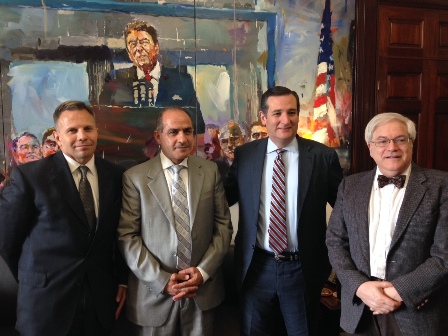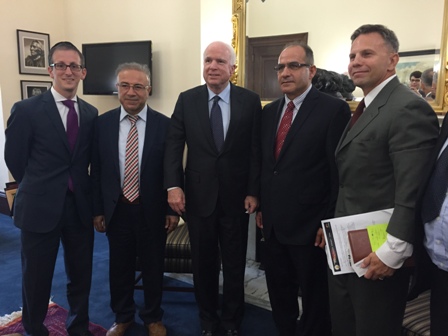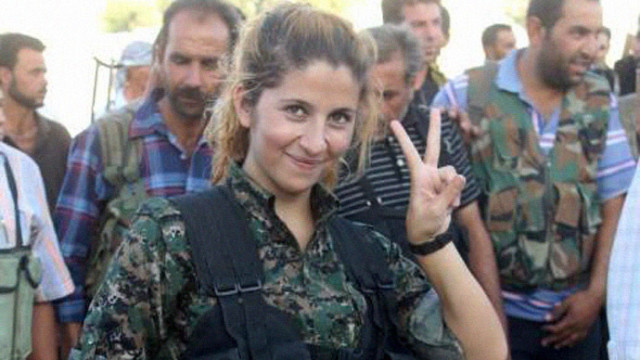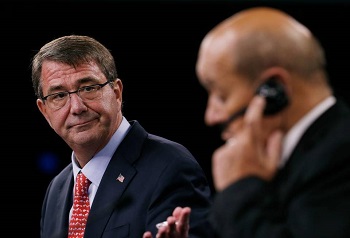U.S. Congress Steps up for the Kurds
The war against the Islamic State is shredding the map of the modern Middle East based on the Sykes Picot Treaty of 1916. The Treaty divided the WWI spheres of influence in the post-Ottoman Empire era between the French and British wartime allies. That was reflected in the Treaty of Sevres in 1920, the declaration of Mandates at San Remo in the same year and after the Greco –Turkish war ended with the Treaty of Lausanne in 1923. From that emerged Lebanon, Syria, Jordan and Iraq and with the 1947 UN partition plan, the modern Jewish nation, the State of Israel. That left out the Kurds, perhaps the largest landlocked ethnic group with an estimated population of over 35 million divided among Southeastern Turkey, Northern Syria, Northwestern Iran and Northern Iraq. The eruption in 2013 of the self-declared Islamic State conquering vast stretches of both Syria and Iraq has forced the world to recognize the role of the Kurds as an important bulwark against the spread of violent Islamic extremism in the post modern Middle East. One of the results of the US led Operation Iraqi Freedom begun in March 2003, ending in 2011, was the creation of the Kurdish Regional Government.The bloody civil war in Syria began in 2011, it is now well into its fourth year. With more than 230,000 dead and four million refugees, the war has left the Assad regime in control of less than one quarter of the country. The balance of Syria is in the hands of ISIL, al Nusra rebels and the Kurds in the Northeastern province of Hasakah.
The Administration has found itself in a dilemma given the burgeoning successes of Kurdish fighting forces in the “generational war” with the Islamic State. In May and June 2015, Syrian Kurdish YPG militia forces, supported by US –led air strikes, effectively shut down the major north south lines of communications between the Turkish frontier and the ISIL capital of Raqaa. That was evident in the capture of Tel Abyad, the repulse of ISIS forays at Hasakah and battles for control of Ain Issa, 22 kilometers north of Raqaa. These recent YPG advances followed the successful defense against the ISIL forces at the city of Kobane on the border with Turkey at Suruc in December 2014.
Thus, the Obama Administration was confronted with the need to determine how to recognize and reward these vital contributions by Syrian and Iraqi Kurdish fighting units in the war against the Islamic State. Neither did it want to antagonize either Turkish President Erdoğan (who supplied Syrian Islamist rebels fighting Syrian President Assad) or Iranian President Rouhani (with whom a possible nuclear weapons deal was being negotiated). Further, the Administration also wished to avoid further involvement with Iranian-led Iraqi Shiite militias and Hezbollah cadres functioning in both Iraq and Syria.
Nevertheless, the YPG’s relations with the Assad Regime and Iran are problematic for the majority of Syrian Kurdish Peshmerga fighters prevented them from building of an effective force devoid of these connections to combat ISIS. Iraqi Peshmerga forces have secured control of Kirkuk and its major oil fields in Iraq.
The questions posed by this dilemma confronting the Administration are; how to recognize and reward these vital contributions by Syrian and Iraqi Kurdish fighting units in the war against ISIL, all while trying to avoid further involvement with Iranian –led Iraqi Shiite militias and Hezbollah cadres in both Iraq and Syria. The subject of Kurdish contributions in the war strategy combating ISIL was front and center at both a Pentagon news conference on July 6th and a US Senate Armed Services Committee Hearing on July 7, 2015. It also figured prominently in private discussions on Capitol Hill on July 8th with Senators who support the Kurdish war effort.
Enter Shoshana Bryen of the Jewish Policy Center
One of Washington’s more astute analysts of Administration policies in the Middle East is Shoshana Bryen executive director of the Jewish Policy Center. She outlined her views about US policies towards the Kurds in a Washington, DC Center for Security Policy (CSP) Seminar video released on June 4, 2015. She presented on the current issues defining US relations with the Kurds. Among her takeaways from the CSP seminar were:
- The US should recognize the Kurds politically;
- The US should directly engage in discussions and arming them;
- That one of the plausible outcomes of the current war with ISIS should be the protection of minorities in the Near East- the Kurds, Israel and the Berbers in North Africa;
- That Iran and Assad created the space for the rise of ISIS;
- That the US failed to take advantage of the drop in oil prices to pressure compliance by Iran that has spent billions in support of Assad and Hezbollah, its proxy in Lebanon.
Listen to this You Tube audio of the CSP-sponsored presentation by Bryen.
In our July NER article, “Empowering Kurdistan” we highlighted early May 2015 discussions between President Barzani of the Iraqi KRG and President Obama and his National Security aides. That included the vital issue of promised arms deliveries; a key point of Bryen about recognizing and talking directly with the Kurds. A recent Iconoclast post highlighting Pentagon news conferences on July 6th contrasted the President’s lack of a coherent strategy in combating ISIL with the laudatory comments by Secretary of Defense Ashton Carter praising the Kurdish forces for their victories against ISIL.
In an American Thinker article by Bryen, “Pristine War and Zero Casualties,” she noted the ISIL war doctrine adopted by the President as Commander in Chief:
President Obama had a brief—and unusual—visit to the Pentagon this week. Normally, he receives his national security briefings in the White House, but he had a message to deliver about America’s war against ISIS. “Ideologies,” he said, “are not defeated with guns; they are defeated by better ideas.”
She pointed out the dilemma this war fighting doctrine placed on U.S. coalition forces:
War is, by its nature, ugly. There are some agreed-upon rules (sometimes honored in the breech) and there are some countries that make their own rules – higher or lower than international standards. Chairman of the U.S. Joint Chiefs of Staff Martin Dempsey said Israel in the 2014 Gaza War went to “extraordinary lengths” to protect the civilian population within which Hamas had hidden. So much so that he sent a senior American military delegation to learn from Israeli tactics.
The White House, which criticized Israel at that time for not being careful enough, appears to have set its own standard for the American Air Force: zero civilian casualties.
It was noticed on Capitol Hill that the number of air sorties against ISIS in Iraq and Syria is very small compared to prior air campaigns in the region: 1,241 sorties a day during Operation Desert Storm; 691 a day in the first month of the Iraq War; and 86 a day during the opening phase of the Afghanistan War. The coalition is presently averaging 12 strike sorties a day. The reason, according to an Air Force official, is that, “there’s a target of zero civilian casualties, so if there are civilian casualty concerns, we would continue to monitor a target or a potential target to see if there is a way to mitigate that.”
It has been estimated the only 30 percent of American sorties drop their bombs; the rest abort.
These views of Bryen had a bearing on Capitol Hill July 7th, given appearances by Secretary of Defense Ashton Carter and JCS Chairman General Dempsey before a Hearing on the Administration’s ISIS war strategy. They were closely questioned by Senators, Ayotte (R-NH), Ernst (R-NE), Cotton (R-AK), Graham (R-SC) and Chairman McCain (R-AZ). They questioned how many Syrian rebels had been trained by US coalition–led forces. A less than paltry 60, as revealed by Secretary Carter. The stark contrast was with the 160,000 Iraqi Peshmerga and YPG and Syrian Kurdish forces with upwards of 13,000 trained fighters. When asked whether the Kurdish Peshmerga and Syrian Kurdish forces were receiving arms directly, both Secretary Carter and General Dempsey suggested that Iraqi Kurds were receiving weapons directly, by-passing Baghdad. Those remarks were vigorously contested by KRG representatives. Carter referenced the separate arms deliveries from both France and Germany. The latter’s highly effective anti-tank missile, the Milan, ironically are used to destroy US tanks, mobile artillery and Humvees abandoned by fleeing Iraqi national forces that fell into the hands of advancing ISIL forces. Chairman McCain raised the matter of posting USAF JTAC personnel to assist Kurdish forces on the ground in precision strikes against ISIL targets. However, the reality is that would violate the Obama war doctrine of no boots on the ground. That is excepting the several hundred Army and Marine trainers of Iraqi national and possibly Sunni cadres in Iraq.
Watch the C-SPAN Video of the US Senate Armed Services Committee Hearing with Secretary of Defense Carter and JCS Chairman Gen. Dempsey:
Enter KUDNAS and LCPR on Capitol Hill

Lt. Col. (ret.) Anthony Shaffer of LCPR, Sherkoh Abbas of KUDNAS, Sen. Ted Cruz (R-TX) and Dr. Robert Sklaroff July 8, 2015.
Despite the recognition of the Syrian Kurdish successes touted by Secretary of Defense Carter, there is a quandary, according to KUDNAS President Abbas. The majority of Syrian Kurdish fighters are not YPG militia. Most Syrian Kurds, he contends do not back the YPG because of their links to the Assad Regime, Iran and the PKK in Turkey. He reported 7,000 Syrian Peshmerga trained by the KRG in Iraq who the YPG has barred from returning to fight ISIS. Another 6,000 Syrian Peshmerga are awaiting equipment. Abbas suggested that for the Syrian Kurds to realize their full potential to eject ISIS from the Kurdish homeland in Northern Syria would require the YPG to delink from Assad and Iran. Islamist Turkish President Erdogan opposes Syrian Kurdish aspirations. However, given his loss of a super-majority in the Ankara parliament following the June 7th general elections he may have fewer options. He is confronted opposition of the country’s military to establish a buffer zone in Northern Syria. He may ultimately have come to terms accepting Syrian Kurds autonomy as he did with the Iraqi KRG.
Sherkoh Abbas, President of the Kurdish National Assembly of Syria (KUDNAS) and representatives of the London Center for Policy Research (LCPR), V.P. Eli Gold and U.S. Army (ret.) Lt. Col. Anthony “Tony” Shaffer, arranged a meeting with Senator Ted Cruz (R-TX) on Capitol Hill, July 8, 2015. Dr. Robert Skarloff accompanied them to the session with Cruz. Herbert London, President Emeritus of the Hudson Institute, is the founder and head of the LCPR. On June 25, 2015, Abbas and LCPR representatives, including Gold, met with US Representatives Trent Franks (R-AZ), Ed Royce (R-CA), Rep. Dana Rohrabacher (R-CA) and other Congressional Representatives supporting Kurdish efforts in the war with ISIS. The KUDNAS- LCPR team and Dr. Abdulhakim Bashar, Vice President of the Syrian National Coalition and a leader of the Kurdish National Council, had earlier on June 15, 2015 met with Senator John McCain (R-AZ) Chairman of the Senate Armed Services Committee. Abbas said that both Senators Cruz and McCain fully support US providing direct military aid to the Kurdish Syrian and Iraqi Peshmerga. Abbas said at the conclusion of yesterday’s Capitol Hill visits, “there is strong bipartisan support for either federation or independence for Syrian Kurdistan.” Since US policy regarding the Kurds is in flux, it should be noted that LCPR’s purpose is not advocacy, but rather the fixing of current policy.

Eli Gold of LCPR, Dr. AbdulHakim Bashar of KNC, Sen. John McCain, Sherkoh Abbas of KUDNAS and Lt. Col. (Ret.) Anthony Shaffer of LCPR, Capitol Hill, June 15, 2015.
During a June 17, 2015 House Armed Services Committee Hearing on the Middle East and Combating ISIS, Rep. Trent Franks (R-AZ) specifically mentioned his meeting with Abbas of KUDNAS and questioned Secretary of Defense Carter about the delays in supplying Kurdish forces and whether the Administration had opposed specific enabling language in the National Defense Appropriations Act (NDAA) legislation. Secretary Carter started out commending the fighting capabilities of Kurdish forces. However, in his response to Rep. Franks’ question, Carter indicated that the Administration hued to the line of indirect supply of equipment to Iraqi Peshmerga forces via the existing arrangement with the Al-Abadi regime in Baghdad. He called the arrangement a furtherance of Administration support for the Iraqi multi-sectarian state. Doubtless that answer did not satisfy Rep. Franks.
Watch this C-Span video of this exchange between Rep. Franks and Secretary Carter on arming the Kurds directly:
As a follow up to yesterday’s Capitol Hill session, an aide to Sen. Cruz sent Dr. Robert Sklaroff this C-Span video excerpt of the Senator’s questioning of Marine General Joseph Dunford, Jr. at his confirmation hearing today on his appointment as the new Chairman of the Joint Chief of Staff. The Senator made specific reference to comments of a “senior Kurdish leader’ – a possible reference to Abbas –- contesting whether the Pentagon was delivering “serious weapons” to the Kurds. Further, the Senator picked up on our suggestion about coordinating coalition air strikes with Kurdish forces. Dunford indicated that he would follow up with responses on both these issues that arose during yesterday’s visit by the KUDNAS delegation.
Watch this C-Span You Tube video of the exchange between Sen. Cruz and Gen Dunford on these issues:
This episode demonstrates the power of networking and developing effective support for Syrian Kurdish militia and Iraqi Kurdish Peshmerga; while questioning the Obama air war fighting doctrine.
The episode began with an email comment by Dr. Sklaroff to our Iconoclast post on Secretary Carter’s praise of Kurdish victories in Syria notifying us of the pending KUDNAS Capitol Hill appointments scheduled for July 8th. Sklaroff had co-authored articles with Abbas over the past several years concerned with Kurdish independence and arming of Kurdish fighters opposing the Islamic State. We reached out to Bryen at the Jewish Policy Center to discuss the matters of possible Israeli and US assistance arming and training Kurdish forces. We reviewed the limits of possible Israeli assistance to the Kurds given multiple threats to the Jewish nation on its borders with Syria, Lebanon, Gaza and the Sinai. Israeli PM Netanyahu has gone on record supporting Kurdish Independence. What emerged was a suggestion that Abbas of KUDNAS might discuss with the Senators. The proposition that emerged was the Administration consider assigning 24/7 air intelligence squadrons from the USAF Special Operations Command to CENTCOM air operations in support of Syrian Kurdish and Iraqi Peshmerga forces on the ground. Instead of putting US JTAC boots on the ground, as suggested by Senator McCain, personnel from Kurdish fighting units would be given equivalent training and equipped with specialized electronic communications and laser target identification systems. This would assist in precisely targeting air war mission sorties thereby avoiding collateral civilian casualties.
Initially, KUDNAS had only the Cruz appointment arranged. Through the network effort they were able to meet half a dozen Senators and aides with a targeted message.
This collaborative effort resulted in a productive day for KUDNAS and the LCPR team on Capitol Hill. It is an example of the power of networking in pursuit of a worthy cause: empowering Kurdistan. It also might spare civilian lives in US-led coalition air operations. But the jury is still out on the Administration arming the Kurds. As Bryen cautioned the ultimately recognition of the Kurds will have to wait until we know the outcome of the 2016 Presidential election.
EDITORS NOTE: This column originally appeared in the New English Review.



